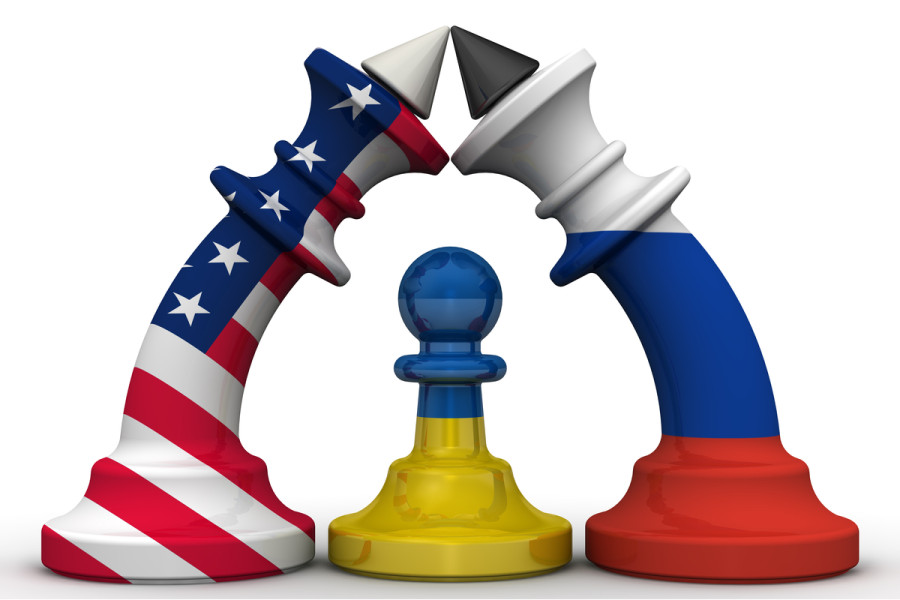Columns
Worsening of Russia-West relations
NATO’s intervention in Kosovo is seen as one of the worst US foreign policy blunders.
Gaurav Raja Dahal
After the dissolution of the Union of Soviet Socialist Republics (USSR) on December 26, 1991, the economies of all its 14 republics went spiralling downwards. Private enterprise was prohibited in the USSR, but with the entrance of a capital market economy after its collapse, the income gap between the rich and the poor grew exponentially, resulting in a diminishing living standard of the people. Since then, the Russian Federation has been struggling to preserve its reputation as one of the global superpowers. Despite its efforts, it hasn't been able to expand its influence either globally or regionally, resulting in its and the West's continuous struggle and attempts to see each other as a threat to their ideologies. To date, the Federation does not accept American hegemony, and its perception of itself as a world power has been the major reason for the bitterness in the relationship between it and the West. Despite these drawbacks, Russia has improved a lot, and has been able to stand out as one of the global superpowers in this current era with a strong military and economy.
The United States and Russia both have common imperialist goals which has resulted in their sustaining a constant state of tension regarding their geopolitical interests. This state of tension is also fuelled by their ideological and constant political disagreements. Their political rivalry and clash of cultures and ideologies has led the relation between these two to deteriorate throughout history. US-imposed sanctions and an increase in the activities of US-led North Atlantic Treaty Organization (NATO) forces throughout Europe has become the major reason which has been upsetting the Russian government apart from their historical tensions.
Russian interest in Crimea
NATO’s intervention in Kosovo is considered to be one of the worst US foreign policy blunders within the international community as the bombing by NATO was done without the approval of the UN Security Council. Empowering the Kosovo Liberation Army was considered a controversial campaign of NATO because it was empowering a revolutionary political movement and attacking a country that had not been involved in armed conflict with any of the NATO member countries. This intervention has served to transform NATO's reputation from a defensive military alliance to an ad hoc Western coalition, and is seen by the Federation as a mechanism to change the regime. Consequently, the Russian Federation undertook Kosovo intervention as an excuse for the annexation of Crimea, accompanied by a Russian military intervention in 2014.
Crimea has been considered to be the perfect strategic location for Russia because it is its only access to the Black Sea, Mediterranean Sea and the Balkan area. Russia also has a Black Sea fleet at Sevastopol in Crimea, which is its only warm water port. Due to this reason, to have Crimea under its control was a must for Russia. If Ukraine were to become a member of the European Union or NATO, Russia would lose these benefits from Crimea. Therefore, even though Ukraine is an independent country, Russia supported Crimea with its military forces. The peace agreement, signed by the newly formed government with the European Union after Ukrainian President Viktor Yanukovych was ousted to Russia in 2014 as a result of the Maidan revolution was condemned as an "illegal coup" by President Putin, stating that Yanukovych was a democratically elected president and replacing him was an undemocratic move.
There were also high possibilities that the new government of Ukraine would choose the West over Russia and join the European Union as well as become a member of NATO. This would have resulted in a direct threat to Russia's geopolitics and national security because it would be sharing its border with NATO member countries. Therefore, this intervention made by the Russian military over Crimea can be seen as the only option left with Russia to secure its geopolitical interest and its navy stronghold.
Latvia, Estonia and Lithuania were also part of the USSR before its collapse, and they were provided NATO membership after their independence. Currently, they are members of NATO and the European Union as well. Russia perceives the enlargement of the European Union and NATO as a Western infringement of its geopolitical interest and influence. These attempts are seen as an attempt of US-led NATO to corner Russia. This intervention has also shown that Russia is very sensitive regarding its geopolitical matters. The Western countries should comprehend that they have to maintain prudence while dealing with the countries which are under the Russian sphere of influence. The growth in Russia's defence spending patterns can also be seen as its increasing interest in securing its sphere of influence and as a measure to tackle possible dangers and threats from the US and its European allies.
Military build-up
Last spring, Russia sent more than 100,000 troops and equipment near the Ukrainian border which was likely seen as a military offensive, and then pulled most of them back labelling it a training exercise. Similar to this, the recent build-up of Russian troops along the border with Ukraine has once again grabbed the attention of the whole world, especially Ukraine and NATO. Despite the military build-up, a Russian invasion seems rather unlikely and this may just be an attempt to caution its weaker neighbour keen to join NATO and receive aid and supplies.
Ukraine has been inclining towards the US-led NATO alliance as it has been receiving security aid and more than $2 billion as assistance from the US since 2014. Likewise, there has been an increase in NATO activities in and around Ukraine recently. Russia sees this as a direct threat to its security. Subsequently, this military build-up can also be seen as a Russian move to caution US-led NATO as it understands that current US priorities are focused on the global pandemic and its marred relations with China, and Russia anticipates that the US now is not willing to fight with it over Ukraine who is not even a NATO member. As both Russia and NATO want to avoid a direct military confrontation, this build-up can be seen as a signal from Russia to pull the US away from Ukraine.




 18.12°C Kathmandu
18.12°C Kathmandu















